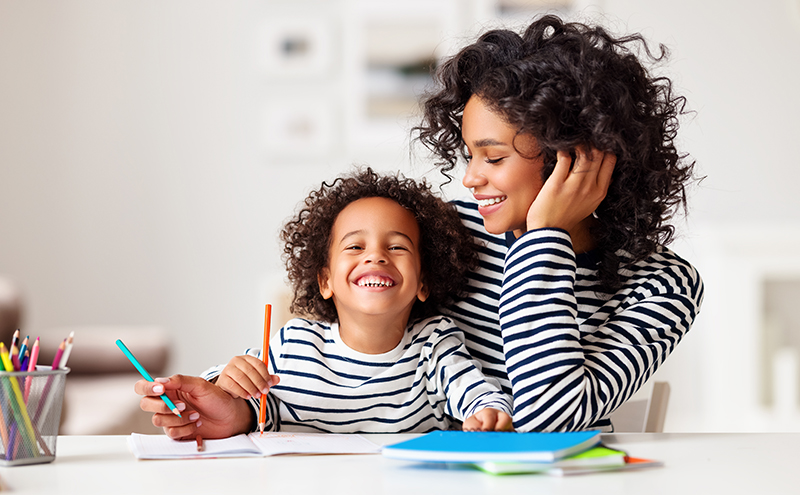
Kids That Inspire – Viewing Life With Different Eyes
Why is it that we stop believing that we can try — and accomplish — hard things at a certain age? As adults, we see the world for its challenges and possible downfalls, and as parents, we feel the need to protect our kids at every turn. Kids, however, are constantly pushed into new, challenging, and uncomfortable situations and take them on in stride. The pandemic has made this even more apparent as kids are being forced to deal with their parents’ struggles as well as their own. They are increasingly pressured and influenced by a digital world, and they had to suddenly transition and learn new communication styles during an extended period of social distancing. Kids have been amazing at navigating the changes during the pandemic, and I think we underestimate our kids’ example in courage, especially in the emotional challenges the pandemic has brought.
In first grade, my daughter won the “Friendship award” for her class. She was delighted to go to school every day and came home with a smile and stories upon stories of her grand school adventures with all the kids in her class. Fast forward 1 year (and 11 months into a pandemic), and I was faced with a second grader who was hiding under her desk at school and crying for 45 minutes every morning while refusing to get into the car to go to school. What happened? How had I failed as a mother? How do I fix this?
While trying to pin down what was going on at school, I realized that my daughter was carrying a lot of fear about me. As an emergency medicine physician, I was walking into COVID every day. Even though she wasn’t vocalizing it, she told me later that she was afraid every day that I was going to die. What she heard was that COVID was dangerous and something to be feared, yet her mom was touching it every time she worked. What a heavy load for an 8-year-old to carry! Now, take that anxiety and mix it with a stressful episode at school where she “lost it” and was sent into the hallway, and we had a perfect mix of an emotionally charged and very memorable embarrassing event for a kid who strives for perfection.
Think of your most embarrassing moment. Now, think about being sent back into that moment. Every. Single. Day. It takes a ridiculous amount of courage to continue to walk into that. As we started to talk through the issues at school and sort through the issues behind the issues, I began to realize just how courageous my 8-year-old was. She is inspiring. Now, she is leading the way, as a kid with a counselor, courageously normalizing mental health issues for other kids.
While I had one kid externalizing her feelings of stress, my other child was silently internalizing his. He is my first born, an 11-year-old people pleaser, a peacemaker, and also a perfectionist. When things with my daughter could be loud and uncomfortable, he was bending over backwards to try to please and make peace. At the same time, my roles during the pandemic as medical director of three different emergency departments while still working a full clinical load made the lines between work and home very blurred. My time with my family was always in multi-task mode. Quality time with me looked like sitting in the same room while I had a meeting in my ear or a computer on my lap.
During this time, my son started the same conversation with me at least three times over a series of a couple of months. Each time, he would start the conversation saying that he thought people did not like him. I suspect the first couple of conversations ended when I dismissed him in some capacity because he is a generally agreeable sort, so the sentiment seemed somewhat unlikely. The last attempt at the conversation went something like this:
“Mom, I need to talk to you, but I think you’ll be upset.”
“’I’m happy to talk. What do you want to talk about?”
“I think people don’t like me.”
“Who do you think doesn’t like you?”
“You.”
Mic drop. He now had my full attention, and I was sitting down. What? How could my first-born think I didn’t like him? Did he not see all I did for him? Did he not feel my hugs and hear my verbal affirmations of love?
What I learned in the next hour plus of this conversation was that my display of love for him was being overshadowed by the unhappiness and stress I was displaying as the pandemic work increased and was perpetually brought home with me. He said that he took my unhappiness as an expression of how he was doing as a son. Essentially, if he could be a better kid, I wouldn’t be as unhappy as a mother. The truth was that my unhappiness was much more a reflection of how I felt I was underperforming as a mother, a physician, a leader, and a wife all at once. He was trying to carry that burden for me. What a load for an 11-year-old to carry! Everyone needs someone to be able to tell them what they need to hear, even when it is hard to say and difficult to hear. His honesty in a hard conversation and his persistence in getting me to hear what I needed to hear was courageous and inspiring.
I want to be courageous like my kids. I want to be strong enough to admit when I need help and be brave enough to overcome embarrassment with grace and grit. I want to be able to deliver the honest words people need to hear with the tact and love it takes for them to be able to hear it. I want to be persistent in advocating for myself and others. I need to be more like my kids. Their courage to do hard things is absolutely an inspiration to me!
The inspiration to try hard things is right in front of us if we only take the opportunity to see it. Then, it’s up to us to use the courage we already have to make the next step.
Jennifer Barker, MD, FACEP, FAAP
Emergency Medicine/Pediatrics
Indianapolis, IN



